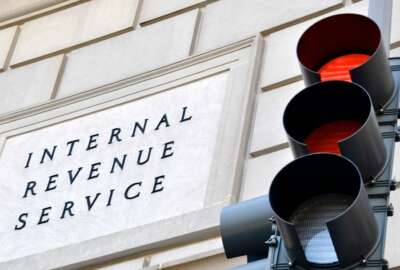
Former DEA officer pleads guilty to using gun in robbery
In today's Federal Newscast, a former officer with the Drug Enforcement Administration admits to taking part in a robbery disguised as a standard search.
- A former officer with the Drug Enforcement Administration pleaded guilty to unlawfully carrying a firearm to carry out what the Justice Department is calling a robbery. Karl Newman admitted to using the gun during the crime that was disguised as an execution of a search warrant. Newman copped to swindling money seized during another search. (Department of Justice)
- The House reauthorized the Homeland Security Department. It’s the first time any chamber in Congress has passed a reauthorization bill for DHS. House Homeland Security Committee Chairman Mike McCaul (R-Texas), House Speaker Paul Ryan (R-Wis.) and seven other committee chairmen with jurisdiction over DHS agreed earlier this year they would make the agency’s reauthorization a priority. The bill now goes to the Senate. (House Homeland Security Committee)
- Both the Trump administration and the House Budget Committee want agencies to cut improper payments in half over the next five to 10 years. Rep. Gerry Connolly (D-Va.) said meeting those goals is possible, but Congress needs to help agencies invest in the right technology and people to get the job done. He’s in favor of giving employees incentives or bonuses for uncovering new cost savings. (Federal News Radio)
- Federal rulemaking slowed down under a new overseer. Neomi Rao, the new chief of the Office of Information and Regulatory Affairs, issued an agenda that stresses a rules cutback. The twice-a-year agenda states that so far during the Trump administration, agencies have already withdrawn 469 proposed rules, and put nearly 400 on the back burner. Economically significant rulemaking dropped by half. Rao said the agenda represents the beginning of fundamental regulatory reform. (Office of Information and Regulatory Affairs)
- The White House’s Office of American Innovation expanded the effort to measure the value of technology investments. Federal chief information officers received some important advice from industry experts when it comes to measuring the value of technology — start now, start small and evolve over time. The White House brought in commercial sector experts from companies like ExxonMobil and JP Morgan Chase to explain how they are using Technology Business Management or TBM standards. Agencies are expected to begin implementing TBM as part of the 2019 capital planning effort. Acting Federal CIO Margie Graves said the value of TBM in measuring the impact of IT on business is clear.
- The Navy has adopted a new approach to selecting what new technologies it should use. The Office of Naval Research will focus on people and speed to deliver top technologies to warfighters. The branch is partnering with academia, to find its best people and investing in a wide base of technologies. (Federal News Radio)
- The first in a new class of Navy aircraft carriers officially joins the fleet tomorrow, but it may have to wait for its mission. The U.S.S. Gerald Ford will officially join the Navy’s rolls in a commissioning ceremony set for tomorrow in Norfolk, Virginia, that’s scheduled to be presided over by President Donald Trump. But the ship won’t actually be ready for warfighting until 2021. That’s because the Navy will need to spend several years testing dozens of new technologies that aren’t present on its existing carriers. The Navy has spent 15 years and $12.9 billion to design and build the first Ford-class carrier — $2.4 billion above the original estimates, but the Government Accountability Office projects another $780 million will be needed to finish testing the Ford. (Federal News Radio)
- A public safety communications network is getting extra cyber armor. Officials with AT&T said they are standing up a security operations center to support the nationwide wireless broadband network called FirstNet. First responders operating on the network will be given screened and secured devices that use special applications designed just for FirstNet users. The company is also separating FirstNet traffic from its commercial network. (Federal News Radio)
- Department of Justice, FBI and Drug Enforcement Administration officials announced the takedown of AlphaBay, an international marketplace on the dark web used to sell illegal drugs and child pornography. An AlphaBay staff member claimed it serviced more than 40,000 illegal vendors for more than 200,000 customers. (Federal News Radio)
Copyright © 2025 Federal News Network. All rights reserved. This website is not intended for users located within the European Economic Area.
Eric White
Eric White is news anchor and Federal Drive producer at Federal News Network.
Follow @FEDERALNEWSCAST
Related Stories

Idea of new space branch for the military gets cold reception from defense leadership
Getty Images/iStockphoto/marcnorman

IRS’ record retention practices now below federal requirements
Related Topics



